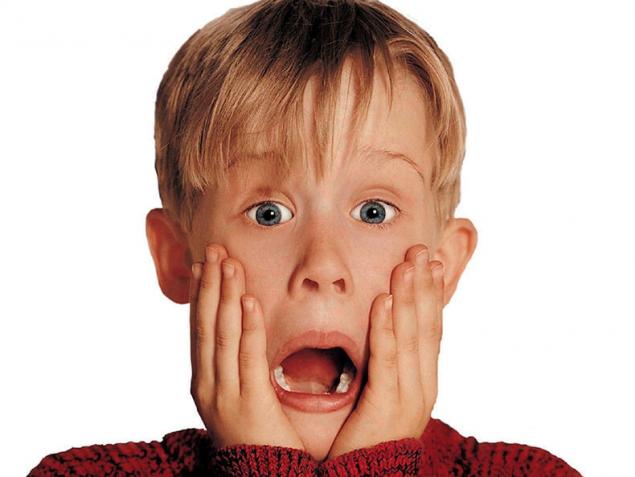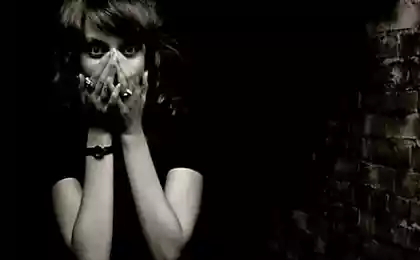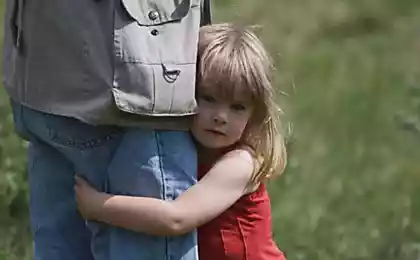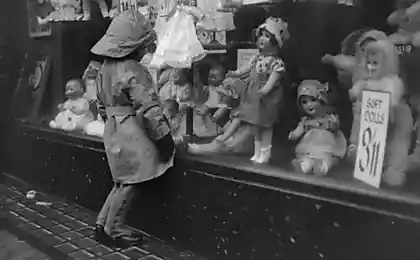573
Children's fears: to understand where and that means
I stood near the escalator and suddenly noticed the young mother who was trying to get his little daughter to stand up on a moving stage. The child, who looked to be about four years, lagged behind, clinging to the railing and cried: "no, No, mom, I'm scared!" The mother, whose hands were full of bundles, continued to pull the baby. "Don't be such a little girl, she said to her, I'm ashamed of you. There is nothing terrible."
In this time of high gray-haired man who was waiting to go on the escalator, bent down to the little girl and said, "You know what it is? Is a ladder for young rabbits. At night when the store is closed, they jump the stairs. It's their favorite game. But the day the rabbits are scared of people and hide, allowing boys and girls to ride their steps to night".

"How wonderful," I thought to myself. Must be, this man has children and grandchildren, if he is able so well to distract the child. But something about this situation made me again and again to return to it. It was so cute — and yet something wasn't right.
I realized this later that evening. The trouble was that though the girl and persuaded to climb the escalator, no one told her that it is normal that she is afraid. But it is much more important than just distract her. Fears young children often have so little in common with the reality that adults almost always say nothing. I remember I kept saying so, when my daughter was little. What a pity that I wasn't such a wise woman like yourself now!
What I've learned over the years is the fact that irrational fears are often much stronger than the fears are real, and they predominate in early childhood. Feelings of inadequacy and unattractiveness in adults related to the fact that, when they admitted that they are scared in a particular situation, they were told that they are naive, stupid and foolish.
For small children it is essential to know that they are normal and worthy of love. Horrible experience feelings that other people don't understand. A bad thing in itself to be afraid of thunderstorms or the dark, and even worse when the people you love, lose patience or get angry at you for it. Children's fears are similar to fatigue when the baby just can't keep the events under control.
These feelings engulf it entirely. If you can manage them, we'd be dealing with an adult, not a child. When it seems that a small child all the time is afraid of something, we need to analyse where are the fears and what they mean.
"When I was a little girl — remember my friend — I was afraid of the lion that walked the night in my room. My father tried to cheer me up, saying that it was impossible and that all the lions live in the zoo. It did not help, because I knew that he was right; when he was near, all the lions were really at the zoo. But just when I was alone in the dark, one lion left the zoo and came to torment me. It seemed so clear and logical that I couldn't understand why my father didn't understand me."
Adults should remember that young children see the world very different. For example, when my daughter was four, she was terrified of the dark. Nightlight in her room and the light in the hallway didn't seem to help. And despite the fact that I read all the books on child psychology, I was acting like any other tired, exhausted and downtrodden mother. "In the dark there is nothing to worry", I said.
One night the daughter looked at me with serious eyes and said, "I'm not afraid of your dark I'm afraid of the dark." We can't dismiss the rich and the powerful experiences that gives us a fantasy, considering them inconsequential or unreal. To do so means to cut from a child's deepest feelings.
Why would not afraid of the child on the escalator — his fear was very real. To tell him that he is stupid, does not mean get rid of fear. And if you insinuate that it's bad, if so stop mom, you can call it a feeling that something is not right, he doesn't deserve love.
Parents are often reluctant to acknowledge children's fears because they are afraid that by doing so they will fix them and will even promote the birth of new. This concern can be understood, but it is impossible to recognize it as justified. Assuming that fear exists, and to show compassion, then it will be the best way to help him disappear. In all my years of working with parents and children I do not remember a single case where sympathy and understanding would have reinforced the fears of childhood.
One mother was very angry at me when I told her crying child: "I know how miserable you feel because of what my mom is going to leave you here, in the kindergarten". As the mother explained: "I try so hard to convince the daughter that there is nothing wrong, you are your words take all my hard work!" Her anger, however, shifted in embarrassment when the girl buried in my lap, sucking on a finger and slightly pouting but no longer crying.
Each child will come in due time
Do not make children the meaning of all your life
When you tell your child that you understand his fear and that many children feel the same, you loose the energy to overcome fear. A child who feels: "I'm good", has sufficient energy to cope with fears. The bravest child in the doctor's office is the one who said, "You may be scared, and then you should cry. I'll hold you tightly by the hand, and everything will be over soon". With such moral support is hardly something which the child would not be able to do.published
Author: EDA Leshan "When your child drives you crazy"
Source: vk.com/ekaterina_kes?w=wall-6084434_4005
In this time of high gray-haired man who was waiting to go on the escalator, bent down to the little girl and said, "You know what it is? Is a ladder for young rabbits. At night when the store is closed, they jump the stairs. It's their favorite game. But the day the rabbits are scared of people and hide, allowing boys and girls to ride their steps to night".

"How wonderful," I thought to myself. Must be, this man has children and grandchildren, if he is able so well to distract the child. But something about this situation made me again and again to return to it. It was so cute — and yet something wasn't right.
I realized this later that evening. The trouble was that though the girl and persuaded to climb the escalator, no one told her that it is normal that she is afraid. But it is much more important than just distract her. Fears young children often have so little in common with the reality that adults almost always say nothing. I remember I kept saying so, when my daughter was little. What a pity that I wasn't such a wise woman like yourself now!
What I've learned over the years is the fact that irrational fears are often much stronger than the fears are real, and they predominate in early childhood. Feelings of inadequacy and unattractiveness in adults related to the fact that, when they admitted that they are scared in a particular situation, they were told that they are naive, stupid and foolish.
For small children it is essential to know that they are normal and worthy of love. Horrible experience feelings that other people don't understand. A bad thing in itself to be afraid of thunderstorms or the dark, and even worse when the people you love, lose patience or get angry at you for it. Children's fears are similar to fatigue when the baby just can't keep the events under control.
These feelings engulf it entirely. If you can manage them, we'd be dealing with an adult, not a child. When it seems that a small child all the time is afraid of something, we need to analyse where are the fears and what they mean.
"When I was a little girl — remember my friend — I was afraid of the lion that walked the night in my room. My father tried to cheer me up, saying that it was impossible and that all the lions live in the zoo. It did not help, because I knew that he was right; when he was near, all the lions were really at the zoo. But just when I was alone in the dark, one lion left the zoo and came to torment me. It seemed so clear and logical that I couldn't understand why my father didn't understand me."
Adults should remember that young children see the world very different. For example, when my daughter was four, she was terrified of the dark. Nightlight in her room and the light in the hallway didn't seem to help. And despite the fact that I read all the books on child psychology, I was acting like any other tired, exhausted and downtrodden mother. "In the dark there is nothing to worry", I said.
One night the daughter looked at me with serious eyes and said, "I'm not afraid of your dark I'm afraid of the dark." We can't dismiss the rich and the powerful experiences that gives us a fantasy, considering them inconsequential or unreal. To do so means to cut from a child's deepest feelings.
Why would not afraid of the child on the escalator — his fear was very real. To tell him that he is stupid, does not mean get rid of fear. And if you insinuate that it's bad, if so stop mom, you can call it a feeling that something is not right, he doesn't deserve love.
Parents are often reluctant to acknowledge children's fears because they are afraid that by doing so they will fix them and will even promote the birth of new. This concern can be understood, but it is impossible to recognize it as justified. Assuming that fear exists, and to show compassion, then it will be the best way to help him disappear. In all my years of working with parents and children I do not remember a single case where sympathy and understanding would have reinforced the fears of childhood.
One mother was very angry at me when I told her crying child: "I know how miserable you feel because of what my mom is going to leave you here, in the kindergarten". As the mother explained: "I try so hard to convince the daughter that there is nothing wrong, you are your words take all my hard work!" Her anger, however, shifted in embarrassment when the girl buried in my lap, sucking on a finger and slightly pouting but no longer crying.
Each child will come in due time
Do not make children the meaning of all your life
When you tell your child that you understand his fear and that many children feel the same, you loose the energy to overcome fear. A child who feels: "I'm good", has sufficient energy to cope with fears. The bravest child in the doctor's office is the one who said, "You may be scared, and then you should cry. I'll hold you tightly by the hand, and everything will be over soon". With such moral support is hardly something which the child would not be able to do.published
Author: EDA Leshan "When your child drives you crazy"
Source: vk.com/ekaterina_kes?w=wall-6084434_4005
YOU chose the wrong partner and a few of the reasons why you have no child
Ventilators: fresh air in your home























